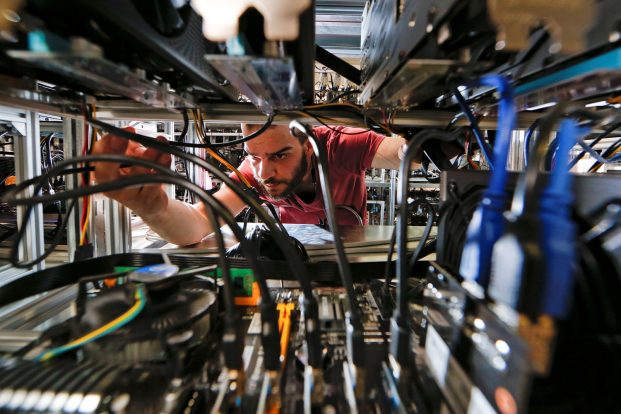The issue with Bitcoin mining
As the world is becoming increasingly aware, Bitcoin is struggling with an energy efficiency crisis. In reality, Bitcoin has always had this issue, but when billionaire business mogul Elon Musk publicly declared that Tesla would stop accepting Bitcoin due to its large carbon footprint, the world sat up and began to take note.
Bitcoin, or BTC, is intrinsically energy-intensive and is so by design. The idea was to ensure that BTC production remains consistent. Unfortunately, the extent of its consumption was unlikely anticipated by its creator(s).
The problem boils down to the fairly simple fact that the Bitcoin network is maintained by a global system of computers that run at full capacity, 24/7 365 days a year. Not just any computers either, but cutting edge, powerful systems that also need to be constantly cooled due to how much heat they generate.
The Cambridge Bitcoin Electricity Consumption Index estimates that bitcoin mining consumes over 123 Terawatt Hours (Twh) — enough energy to power Norway for an entire year.
At its current rate of growth, Bitcoin mining is becoming unsustainable. And many, including Elon Musk, are understandably unwilling to throw their weight behind something they perceive as environmentally unconscionable.
At the same time, the investment landscape in 2021 is changing. Increasingly there is an emphasis on Environmental, Social and Governmental (ESG) investing, which aims to ensure portfolios remain ethical across these parameters.
Unfortunately, Bitcoin is struggling on the environmental front. For those who want exposure to bitcoin but also don’t want their money to contribute negatively to the ongoing battle with global warming, this poses a significant problem.
Making Bitcoin green
While Bitcoin isn’t likely going to go away anytime soon, there are some ways that the technology could evolve to align better with green ideals:
-
Miners switch to renewable energy
In a recent tweet, Musk revealed that he had spoken with North American Bitcoin miners who purportedly committed to “publish current & planned renewable usage.”
But even before Musk’s involvement, more and more Bitcoin miners were proactively making the switch to solar and hydroelectric power sources in many areas.
This is because, when set up properly, these forms of energy are, in fact, much cheaper than fossil fuels. Take for example the city of Sichuan in China, during the province’s rainy season the price of electricity from the local hydroelectric plant becomes the cheapest in the whole world, luring hordes of Bitcoin miners in search of cheaper tariffs.
This is all very optimistic, but obviously investors have little control over these developments. For the time being, much of Bitcoin mining is still being done with coal and other similarly dirty sources. This means that until renewable energy becomes the standard on most electrical grids, Bitcoin will still be, to some extent, contributing to the problem.
-
Investors look to coins with smaller carbon footprints
Obviously Bitcoin isn’t the only cryptocurrency out there, and not all cryptocurrencies are created in the same, energy intensive way. It’s true, other popular projects like Litecoin and Dogecoin use Proof-of-Work (PoW) systems like Bitcoin. But others use drastically different, and more eco-friendly means to generate new coins and secure the network.
Take for example Ethereum. Right now, Ethereum is actually using a system like Bitcoin’s, but this is about to change. The network will be upgrading to a Proof-of-Stake (PoS) consensus protocol that is, in fact, much, much more energy efficient than its current PoW model. Ethereum isn’t alone either. There are several coins out there already that use PoS or other, unique means to create secure digital assets that don’t eat up large amounts of energy.
Of course, Ethereum’s transition is still taking time and it isn’t clear exactly when it will be done. Moreover, other assets vary widely in terms of utility, profitability and underlying technology, so investors will have to commit notable research to ensure their portfolio stays both rewarding and ethical.
-
Offsetting emissions via tokenized carbon credits
One avenue that some investment portfolios are beginning to explore is the use of carbon credits that have themselves been “tokenized” onto a blockchain. Projects, such as Universal Carbon (UPCO2), created by the Universal Protocol Alliance, look to offset carbon emissions by retiring an appropriate amount of carbon which each purchase.
UPCO2 specifically uses carbon credits verified and certified by REDD+ projects. This means that investors can purchase these tokens, which act just like other crypto assets, and use them as a balance against less environmentally friendly products, like precious metals and, of course, Bitcoin.
However, to streamline the process, multi-asset platform Uphold has introduced a single asset that captures the benefits of both Bitcoin and carbon credits, called Bitcoin Zero, or BTC0. Bitcoin Zero couples real Bitcoin with 10 carbon REDD+ rainforest carbon credits, equivalent to retiring 10 tonnes of CO2, to completely eliminate bitcoin emissions each time BTC0 is minted.
Not only is this method a quicker means of clearing up Bitcoin, but it’s likely more beneficial than miners switching from coal to renewable sources.
Clearly, there are paths available for Bitcoin to become greener, and for investors to use their money ethically. Each individual has to balance out what works for them, but carbon credits, and more specifically BTC0, may offer the fastest and easiest solution for those who want to change their impact today.
Ideally, in time, all of these avenues will lead to a future where ESG concerns are no longer relevant. Until then, thoughtful retail customers and institutional players can at least have access to options that can immediately “green up” their portfolios.
ALSO SEE:
The Bitcoin Fund lists on Nasdaq Dubai
Bitcoin plunges on China mining fears and concern about regulation
























